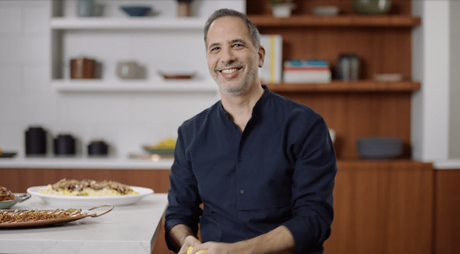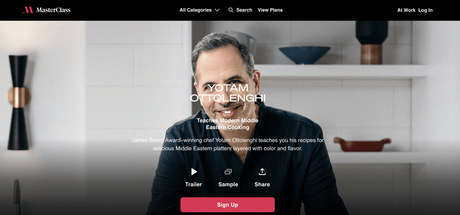Yotam Ottolenghi is an internationally acclaimed chef, and food writer whose books, television shows, and restaurants have won him a legion of fans.
His Masterclass on cooking Mediterranean-style dishes is the perfect way to learn how to prepare his signature recipes with ease. In this review, we'll take a look at what makes the Masterclass so special and why it's worth signing up for.
So let's get started with our Yotam Ottolenghi Masterclass Review.
Who is Yotam Ottolenghi?
Yotam Ottolenghi is an award-winning Israeli-British chef, restaurateur, cookbook author, and food writer. He rose to prominence in the culinary world with his unique combination of Middle Eastern flavors and Western cooking techniques.
His popular cookbooks like Jerusalem, Plenty, and Ottolenghi Simple have all become bestsellers. He has appeared on many TV shows as a celebrity chef, including Saturday Kitchen and The Great British Bake Off.
Yotam has also been praised for his work in raising awareness about Palestinian cuisine, having set up several projects to boost sustainability within the local community.

He is highly respected by both the industry and his peers for his innovative approach to cooking and is seen as one of the most influential chefs of his generation.
Yotam Ottolenghi continues to inspire home cooks and professional chefs alike with his culinary creations. His cookbooks are filled with simple, yet delicious dishes that are sure to please even the most discerning of palates.
From hearty mains like eggplant ragout to sweet treats like hazelnut-almond cake, Yotam's recipes will bring a world of flavor into your kitchen.
Whether you're looking for something quick and easy or a gourmet feast, Yotam Ottolenghi has something for everyone. With his vast knowledge and innovative flair, he is truly one of the greatest chefs of our time.
What Will You Learn in this Masterclass?
A thorough and in-depth learning experience that covers many facets of Middle Eastern cuisine is the Yotam Ottolenghi Teaches Modern Middle Eastern Cooking course.
26 videos totaling a little over 13 minutes each make up the course's 5 hours and 40 minutes of video material.
The course comes with a 56-page PDF recipe book that contains all of the written recipes used in the course, as well as supplementary reading and ideas, in addition to the video material.
The film is divided into five main categories. Each segment provides a thorough overview of Middle Eastern cookery by addressing various facets of the cuisine.
The session begins with an introduction by famous chef and cookbook author Yotam Ottolenghi.
The introduction provides information on his culinary path, including where he began and how growing up in a region of the globe plagued by violence made food even more significant to him than just providing him with nutrition.
He also discusses his "flavor bombs," which are an important part of his cuisine, as well as his laid-back, stress-free attitude to both food and life.
Making a mezze spread, a typical Middle Eastern appetizer is the main subject of the course's first module, Mezze Spread. A tutorial on muhammara, a dipping salad made of peppers and tomatoes, opens the segment.
The lesson discusses the dish's main components, its variations, and the regions of the globe where it is most often consumed.
Additionally, the class offers helpful advice for assembling a stress-free mezze meal at home and for getting to know essential Middle Eastern spices like cumin, coriander, garlic, peppers, and pomegranate molasses.

It also discusses methods for toasting, roasting, and caramelizing foods to get the most taste out of each item.
Pea Spread with Smoky Marinated Feta is the lesson after that in this part. With a brilliant green dish that adds a burst of freshness to any mezze table, this lesson emphasizes how eating is a visual experience.
The course covers Yotam's go-to item for improving everything, how to create a potent infusion oil, and how to create Yotam's "feta on steroids."
The course also offers helpful hints to improve your cooking, such as which lemon segments to skip using, the ideal oil temperature to prevent your feta from disintegrating, and more.
It also includes plating advice to make the food aesthetically attractive and how to prevent your dips from appearing flat and one-dimensional.
Other portions of the course, such as Brunch Spread, Veggie Spread, Main Courses, and Thoughts on Hosting, explore many facets of Middle Eastern cuisine.
Yotam Ottolenghi imparts each lesson in a laid-back, informal manner and offers a plethora of advice and useful information to aid in the creation of delectable and genuine Middle Eastern foods.
The goal of the training is to give you the self-assurance you need to cook a fantastic variety of Middle Eastern foods, walk into the kitchen stress-free, and be happy with the results.
The "star of the Middle Eastern mezze," eggplant, is used to make a delectable salad in Lesson 8 by Ottolenghi.
Although he accepts that many people avoid eating eggplant because they don't know how to prepare it, he offers detailed instructions for doing so in a manner that is both simple and tasty.
Three ingredients make up the dish: Roasted Eggplant, Quick-Picked Chilies, and Quick Preserved Lemon Paste.
Additionally, he highlights how versatile each ingredient is and offers alternative applications for each, such as utilizing the pickled chilies for roast chicken and the lemon paste for cakes, and a citrus yogurt sauce.
Ottolenghi discusses his love of carrots in Lesson 9 and demonstrates how to transform them from bland to delectable and aesthetically pleasing.
He presents Dukkah, which he views as a miraculous must-have ingredient, and offers tips for ensuring that the veggies maintain as much taste as possible. Additionally, he demonstrates how to make this gorgeous meal using the labneh from Lesson 6.
Ottolenghi demonstrates how to prepare a cool Smacked Cucumber Salad with Sumac-Pickled Onions in lesson 10. He offers a method for cooking cucumbers that enhances the taste and is excellent for relieving tension.
Additionally, he describes how to produce the famous bright red pickled onions you find at kebab restaurants, why Persian and Lebanese cucumbers are excellent choices for a cucumber salad, and advice for taste balance to prevent one flavor from overpowering another.
He also gives a summary of the Veggie Spread recipes' taste characteristics and explains why they go well together.
Lessons 11-14 in Section 4, Show-Stopping Middle Eastern Mains, present several well-known Middle Eastern dishes, including Mafalda Pasta with Quick Shatta, which is perhaps one of the most difficult recipes yet since it calls for the simultaneous assembly of five separate ingredients.
But he offers a calm and stress-free method for preparing it as well as helpful advice for mastering the dish. He also offers a shortened recipe for shatta chili sauce that may be made in five minutes rather than three.
Why Do I Recommend This Masterclass?
Below I have mentioned 6 reasons why I recommend this masterclass:
1. Handy reference videos at the end:
The final 10 films, as I've already said, are quick-reference video tutorials rather than being a part of the course. And I really like it, too! It entirely makes sense in the context of Ottolenghi's course.
The final ten lessons make it simple for you to prepare components in advance, which he emphasizes often.
For instance, I prepared the labneh on Thursday, but the veggie spread on Friday night. Instead of having to rewatch the whole Labneh with Berrie's lesson, it was quite simple to discover the labneh since MasterClass had already broken it out into its own video.
2. Incredible video quality:
Even though all of the MasterClass video courses are of the highest caliber, I really enjoyed this one. Together with the camerawork, Ottolenghi's dramatic and vibrant food presentation got me really eager to start cooking.
Every lesson also had lovely visuals, and I particularly enjoyed seeing snapshots that advanced the story.
They greatly assisted in capturing the spirit of the Middle East, whether they were snapshots of Ottolenghi's past or images of his preferred Jerusalem market.
3. On-screen glossary:
There would inevitably be items that the majority of American home chefs are unfamiliar with. You probably wouldn't consider labneh, shatta, or muhammara to be among your standard fare.
Yotam Ottolenghi constantly defines new terms, but there is also a helpful on-screen dictionary that appears and provides a brief explanation. It helps students get that additional degree of confidence and makes it really simple to follow along in class.
4. Learning in a really structured way:
The curriculum was really clear and well-organized. It proceeds in a method that progressively develops abilities, moving from easy through too much more complicated mains.
You'll sometimes require ingredients from previous classes in subsequent dishes, giving you the chance to practice and improve that ability. For instance, in lesson six, you learn how to prepare labneh, and in lesson nine, you utilize it once again.
5. Adaptable recipes that can be utilized in a variety of ways:
I found it especially appealing since almost all recipes may be prepared differently from how they are shown in class. Yotam Ottolenghi, for instance, provides several applications for tahini sauce when creating it.
He also explains how to make a white bean stew using the shakshuka foundation from Lesson 7 - I would have never thought to do that! The recipes' adaptability gave me the impression that I was receiving excellent value for my money.
Not only did I learn 13 predetermined recipes. I was becoming familiar with a vast array of ingredients that might be used in many dishes.
6. Incredibly relaxed and stress-free:
Yotam Ottolenghi states at the beginning and conclusion of the course that improving people's comfort and calmness in the kitchen is one of the main goals of the MasterClass.
He is always at ease during the meal, and you can't help but reflect this in your own cuisine.
I believe Ottolenghi is more attuned to the stressful aspects of cooking than any other chef on MasterClass, from spicy foods that make you cough to tahini which sometimes looks a little off.
I also liked that he was content to smash some garlic or unintentionally leave out some pepper seeds or peel. These little realizations benefit the underconfident cook tremendously since they prevent worrying that anything is amiss.
Conclusion: Yotam Ottolenghi Masterclass Review 2023
Quick Links:The Yotam Ottolenghi Masterclass is an incredibly comprehensive course that will give you the skills to make delicious Mediterranean-style dishes with ease.
From learning how to create iconic flavors within your meals, to understanding why certain ingredients pair so well together, this class offers something for every level of chef.
And with the ability to ask questions and get feedback from a renowned chef - you can't really go wrong! So if you're looking for an interactive, informative, and enjoyable culinary experience, then this course is certainly worth checking out.

